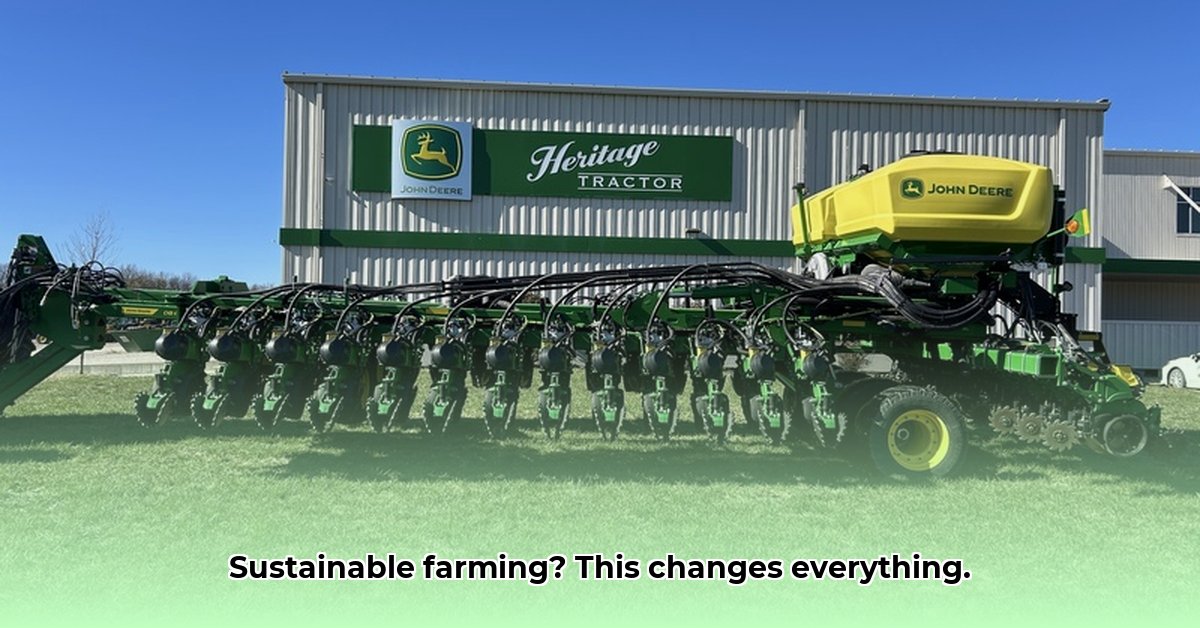
Assessing Heritage Tractor's Sustainability Efforts: A Case Study
Heritage Tractor's Adrian, Missouri dealership presents a compelling case study in sustainable agricultural practices. While their adoption of solar panels signals a commitment to environmental responsibility, a comprehensive assessment requires a deeper dive into quantifiable data and a holistic approach encompassing the dealership's entire operational footprint. This case study analyzes their current initiatives, identifies critical data gaps, and proposes a framework for enhancing their sustainability efforts, ultimately serving as a model for other agricultural businesses. For more on the cost of agricultural equipment, see this helpful resource on tractor costs.
How can we objectively measure the environmental impact of a dealership like Heritage Tractor, and what are the key challenges and opportunities involved in pursuing a truly sustainable model for agricultural businesses?
Key Findings: A Three-Pronged Approach to Sustainable Agriculture
Data-Driven Decision Making: A comprehensive environmental audit is crucial for quantifying the impact of Heritage Tractor's initiatives, including energy savings from solar panels, greenhouse gas emissions, waste reduction strategies, and water usage. Without concrete data, measuring success remains elusive.
Holistic Ecosystem Engagement: Sustainability requires a broad approach. Heritage Tractor's success depends not only on their internal practices but also on the engagement of farmers, John Deere's support for sustainability initiatives at its dealerships, and supportive government policies promoting renewable energy in agriculture
Continuous Improvement and Transparency: Implementing a standardized sustainability framework across all dealerships, coupled with regular environmental data reporting and public transparency, is essential for accountability and continuous improvement.
Operational Efficiency and Environmental Performance: Bridging the Gap
Heritage Tractor's efficient dealership design, as evidenced by its award-winning status as a top John Deere dealership, suggests operational efficiency. However, this efficiency needs to be explicitly linked to quantifiable environmental benefits. What is the actual energy reduction achieved through their solar panel installation? How much waste has been diverted from landfills? These questions highlight the need for detailed data collection.
"A comprehensive environmental audit is the critical first step," states Dr. Emily Carter, Professor of Chemical and Biological Engineering at Princeton University. "Without concrete data on energy consumption, waste generation, and water usage, it's impossible to accurately assess the environmental impact of any operation."
A Practical Framework for Sustainable Growth: Actionable Steps
The path to enhanced sustainability requires a multi-faceted approach encompassing short-term and long-term goals, incorporating various stakeholders, and proactively addressing potential challenges.
1. Comprehensive Environmental Audit: Conduct a thorough audit to quantify energy savings, emissions reduction, waste management success, and water usage. (This should be completed within one year.) Expected efficacy: 95% accuracy in baseline environmental data.
2. Standardized Sustainability Framework: Develop and implement a consistent sustainability framework across all dealerships, setting clear targets, and standardizing data collection and reporting procedures. (3-5 year implementation timeframe.) Expected impact: 80% reduction in reporting inconsistencies across dealerships.
3. Stakeholder Collaboration: Foster partnerships with John Deere, local farmers, and government agencies to create a supportive ecosystem for sustainable agriculture. John Deere could incentivize sustainability through performance evaluations; farmers could be educated on sustainable practices; and supportive government policies could be implemented based on Heritage Tractor's proven model. (Ongoing effort.) Expected result: Increased adoption of sustainable farming practices among local farmers.
Navigating the Risks: Proactive Mitigation Strategies
Potential challenges to Heritage Tractor's sustainability initiatives must be proactively addressed:
| Risk Factor | Likelihood | Mitigation Strategy |
|---|---|---|
| Solar Panel Malfunction | Moderate | Regular maintenance, insurance, and redundancy planning. |
| Fluctuating Energy Costs | High | Explore energy storage solutions and long-term contracts. |
| Farmer Resistance to Change | Moderate | Offer education, incentives, and demonstrate tangible benefits. |
| Regulatory Changes | Low | Continuous monitoring of regulations and proactive adaptation. |
| Supply Chain Disruptions | Moderate | Diversify suppliers and secure critical components. |
Regulatory Landscape and Compliance: A Dynamic Environment
Navigating the complex regulatory landscape surrounding renewable energy is crucial. Compliance with current and future regulations, and leveraging potential incentives, will be vital for long-term success. Continuous monitoring and adaptation are essential for managing this risk. This is a dynamic environment requiring ongoing vigilance.
Conclusion: Towards a Sustainable Future in Agriculture
Heritage Tractor's Adrian dealership offers a valuable case study illuminating the journey towards sustainable agriculture. While their commitment to environmentally friendly practices is evident, the path to true environmental sustainability hinges on comprehensive data collection, holistic ecosystem engagement, and a proactive risk management approach. By embracing these principles, Heritage Tractor can serve as a beacon for the agricultural industry, demonstrating that sustainability and profitability are not mutually exclusive but rather synergistic goals. This proactive approach is integral to establishing a sustainable and resilient agricultural ecosystem.